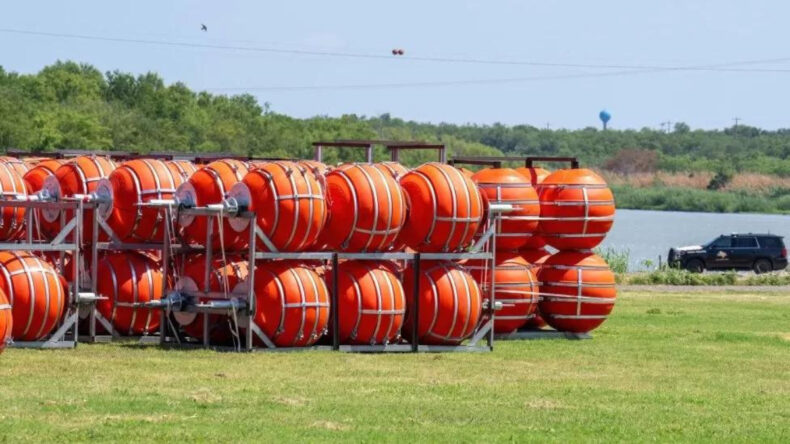The United States Department of Justice has taken legal action against the state of Texas over its recent installation of floating barriers in the Rio Grande, a move that Governor Greg Abbott argues is aimed at deterring migrants from crossing into the state from Mexico. The lawsuit marks a significant escalation in the ongoing controversy surrounding immigration policies and treatment of migrants attempting to enter the US illegally.

The Floating Barriers Controversy
As part of Governor Abbott’s initiative, “Operation Lone Star,” Texas authorities recently placed a series of bright orange, wrecking ball-sized buoys in the middle of the Rio Grande near Eagle Pass, Texas. The move was intended to discourage undocumented migrants from crossing the river into Texas from Mexico.
The US Department of Justice alleges that Texas violated the Rivers and Harbors Appropriation Act by constructing the barriers in US waters without the necessary authorization, raising concerns about threats to navigation, public safety, and humanitarian issues. The legal action claims that the floating barriers pose dangers to navigation, public safety, and humanitarian matters.
However, Governor Abbott, a Republican, has staunchly opposed the Justice Department’s request to remove the barriers. He asserts that Texas has the constitutional authority to protect its borders and challenges the basis of the lawsuit, claiming it is grounded in an obscure statute that does not apply to their actions.
The installation of floating barriers is just one component of Texas’ broader Operation Lone Star, which includes other measures like razor-wire fencing and arresting migrants on trespassing charges. Critics question the effectiveness of these tactics and raise concerns about the treatment of migrants at the US-Mexico border.
Biden Administration’s Response
The Biden administration has expressed concerns about the impact of Abbott’s measures on US Border Patrol operations and the safety of migrants. It accuses the governor of undermining the administration’s efforts to address immigration challenges in a more humane and comprehensive manner.
Mexico has also voiced objections to the floating barriers, contending that they violate international treaties and may encroach on Mexican territory. This issue has added strain to diplomatic relations between the two neighboring countries.
The Justice Department’s legal action seeks an injunction to prevent Texas from building additional barriers and demands the removal of existing barriers at the state’s expense. Governor Abbott has declared his intent to take the case all the way to the United States Supreme Court, setting the stage for a high-stakes legal battle.
Humanitarian Concerns and Immigration Policy Reforms
The controversy surrounding the floating barriers underscores broader concerns about immigration policies and the treatment of migrants at the US-Mexico border. Advocates are calling for a more compassionate approach to address the challenges posed by undocumented immigration and are pushing for comprehensive immigration policy reforms.
The lawsuit between the US Justice Department and Texas over the floating barriers in the Rio Grande adds complexity to the ongoing immigration debate in the United States. Striking a balance between border security and humanitarian concerns will be pivotal as federal and state authorities navigate potential immigration policy reforms. The outcome of this legal battle could have far-reaching implications for immigration enforcement and diplomatic relations with neighboring Mexico.













